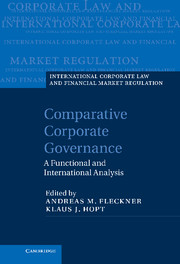5 - Japan
Listed companies' corporate governance
from A - Australia and Asia
Published online by Cambridge University Press: 05 July 2013
Summary
Introduction
The concept of corporate governance has not been given a fixed common definition so far by either company law scholars or practical lawyers in Japan, but noteworthy is the provision of “New Corporate Governance Principles” issued by the Japan Corporate Governance Forum (“JCGF”) on December 15, 2006, to explain the meaning of corporate governance of large listed companies.
It reads as follows: “Corporate governance is a mechanism to ensure company officers entrusted with responsibilities by shareholders fulfill the entrusted responsibilities.” The New Corporate Governance Principles are designed to apply to listed companies in Japan for the purpose of raising the standard of their corporate governance arrangements. In the case of listed companies, shareholders do not handle company management themselves; instead, much of management is entrusted to directors or officers and carried out by them in accordance with the duty to pay reasonable care, the duty of loyalty, and the principle of business judgment rules. Therefore, “entrusted responsibilities” refers to company directors or officers carrying out their duties for the purpose of increasing long-term shareholder values.
The New Corporate Governance Principles also say that corporate governance not only includes the aspect of ensuring company officers’ entrusted responsibilities are fulfilled in normal situations, but also the aspect of preparing in advance for situations in which potential conflicts of interest for the company materialize, i.e., a hostile takeover.
- Type
- Chapter
- Information
- Comparative Corporate GovernanceA Functional and International Analysis, pp. 233 - 272Publisher: Cambridge University PressPrint publication year: 2013

